
Paul Thomas Mann was a German novelist, short story writer, social critic, philanthropist, essayist, and the 1929 Nobel Prize in Literature laureate. His highly symbolic and ironic epic novels and novellas are noted for their insight into the psychology of the artist and the intellectual. His analysis and critique of the European and German soul used modernized versions of German and Biblical stories, as well as the ideas of Johann Wolfgang von Goethe, Friedrich Nietzsche, and Arthur Schopenhauer.
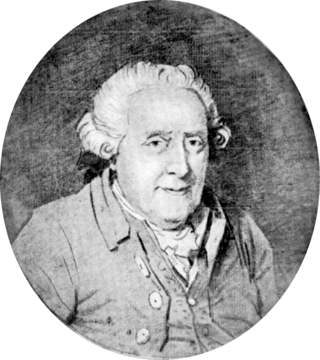
Wilhelm Friedemann Bach was a German composer and musician. He was the second child and eldest son of Johann Sebastian Bach and Maria Barbara Bach. Despite his acknowledged genius as an organist, improviser and composer, his income and employment were unstable, and he died in poverty.
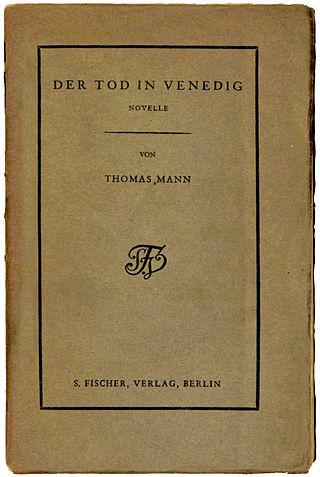
Death in Venice (German: Der Tod in Venedig) is a novella by German author Thomas Mann, published in 1912. It presents an ennobled writer who visits Venice and is liberated, uplifted, and then increasingly obsessed by the sight of a boy in a family of Polish tourists—Tadzio, so nicknamed for Tadeusz. Tadzio was based on a real boy named Władzio whom Mann had observed during his 1911 visit to the city, but the story itself is fiction.
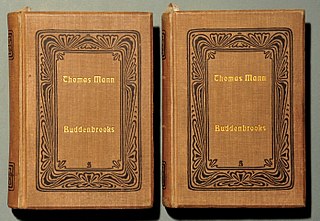
Buddenbrooks is a 1901 novel by Thomas Mann, chronicling the decline of a wealthy north German merchant family over the course of four generations, incidentally portraying the manner of life and mores of the Hanseatic bourgeoisie in the years from 1835 to 1877. Mann drew deeply from the history of his own family, the Mann family of Lübeck, and their milieu.
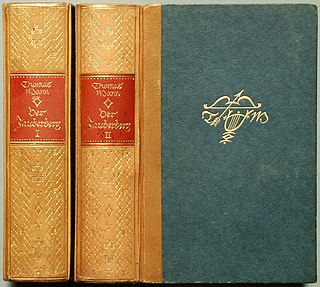
The Magic Mountain is a novel by Thomas Mann, first published in German in November 1924. It is widely considered to be one of the most influential works of twentieth-century German literature.

The Song of the Lark is a novel by American author Willa Cather, written in 1915. It is her third novel to be published.

Doctor Faustus is a German novel written by Thomas Mann, begun in 1943 and published in 1947 as Doktor Faustus: Das Leben des deutschen Tonsetzers Adrian Leverkühn, erzählt von einem Freunde.

Death in Venice, Op. 88, is an opera in two acts by Benjamin Britten, his last. The opera is based on the novella Death in Venice by Thomas Mann. Myfanwy Piper wrote the English libretto. It was first performed at Snape Maltings, near Aldeburgh, England, on 16 June 1973.

The Book of Illusions is a novel by American writer Paul Auster, published in 2002. It was nominated for the International Dublin Literary Award in 2004.

Mera Naam Joker is a 1970 Indian romantic drama film, directed, edited and produced by Raj Kapoor under his banner R. K. Films, and written by Khwaja Ahmad Abbas. The film stars Raj Kapoor as the eponymous character, with his son Rishi Kapoor making his screen debut playing his younger version, along with Simi Garewal, Kseniya Ryabinkina, Padmini, Manoj Kumar and Dharmendra in supporting roles. The plot focuses on a clown who must make his audience laugh at the cost of his own sorrows; three women who shaped his life view his final performance.

Cry to Heaven is a novel by American author Anne Rice published by Alfred A. Knopf in 1982. Taking place in eighteenth-century Italy, it follows the paths of two unlikely collaborators: a Venetian noble and a maestro from Calabria, both trying to succeed in the world of the opera.

Enrico di Borgogna is an opera eroica or "heroic" opera in two acts by Gaetano Donizetti. Bartolomeo Merelli, wrote the Italian libretto based on Der Graf von Burgund by August von Kotzebue.
Friedrich is a novel about two boys and their families as they grow together during Hitler's rise to power and reign in Germany in the 1930s. It is by the author Hans Peter Richter. Friedrich was first printed in 1961.
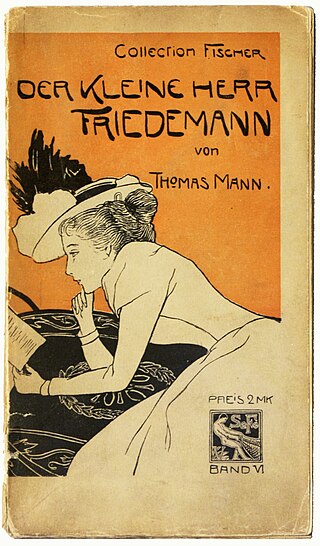
"Little Herr Friedemann" is a short story by Thomas Mann. It initially appeared in 1896 in Die neue Rundschau, and later appeared in 1898 in an anthology of Mann's short stories entitled collectively as Der kleine Herr Friedemann.

Venice is a musical collaboration between Matt Sax and Eric Rosen. The plot focuses on a dystopian near-future fictional city named Venice. The show opened at the Copaken Stage in Kansas City in 2010 as a co-production between Kansas City Rep and Center Theatre Group. Venice also ran at the Public Theater in New York from May 28 through June 30, 2013. The cast of Venice at The Public includes Uzo Aduba, Jennifer Damiano, Jonathan-David, Claybourne Elder, Leslie Odom, Jr., Victoria Platt, Angela Polk, Matt Sax, and Haaz Sleiman.
Batman: The Dark Prince Charming is an original two-volume graphic novel series from American comic book publisher DC Comics and French publisher Dargaud, featuring the DC Universe character Batman. The first volume was released on November 1, 2017, followed by the second volume on June 20, 2018. It was written, illustrated, and painted by Italian artist Enrico Marini and is his first major American publication. In The Dark Prince Charming, Batman pursues the Joker and Harley Quinn, who have kidnapped a child whose mother claims her to be the daughter of Bruce Wayne. The series is considered a standalone, out-of-continuity story.
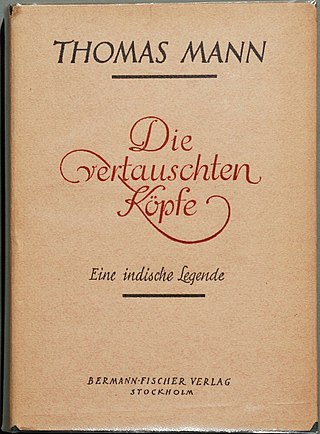
The Transposed Heads is a novella by Thomas Mann. It was written in 1940 and published later that year by Bermann-Fischer. The English translation by H. T. Lowe-Porter was published in 1941 by Alfred A. Knopf. It was one of Mann's last novellas, followed only by The Tables of the Law in 1944 and The Black Swan in 1954. Set in India, the story is a jocular retelling of an ancient folk legend.
The Blood of the Walsungs is a novella written by the German author Thomas Mann. Originally written in 1905 and set to be published in the January 1906 issue of Die Neue Rundschau, it was pulled from print because of its similarities to Mann's new wife and her family. The story was finally published in Germany in 1921 and has since remained one of Mann's most controversial works for its portrayal of anti-Semitism and incest.
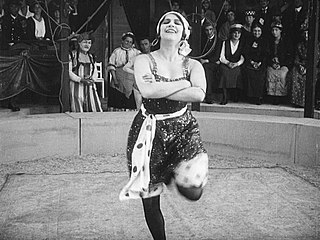
Superstition is a 1919 German silent drama film directed by Georg Jacoby and starring Ellen Richter and Victor Janson.
















